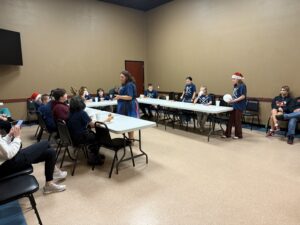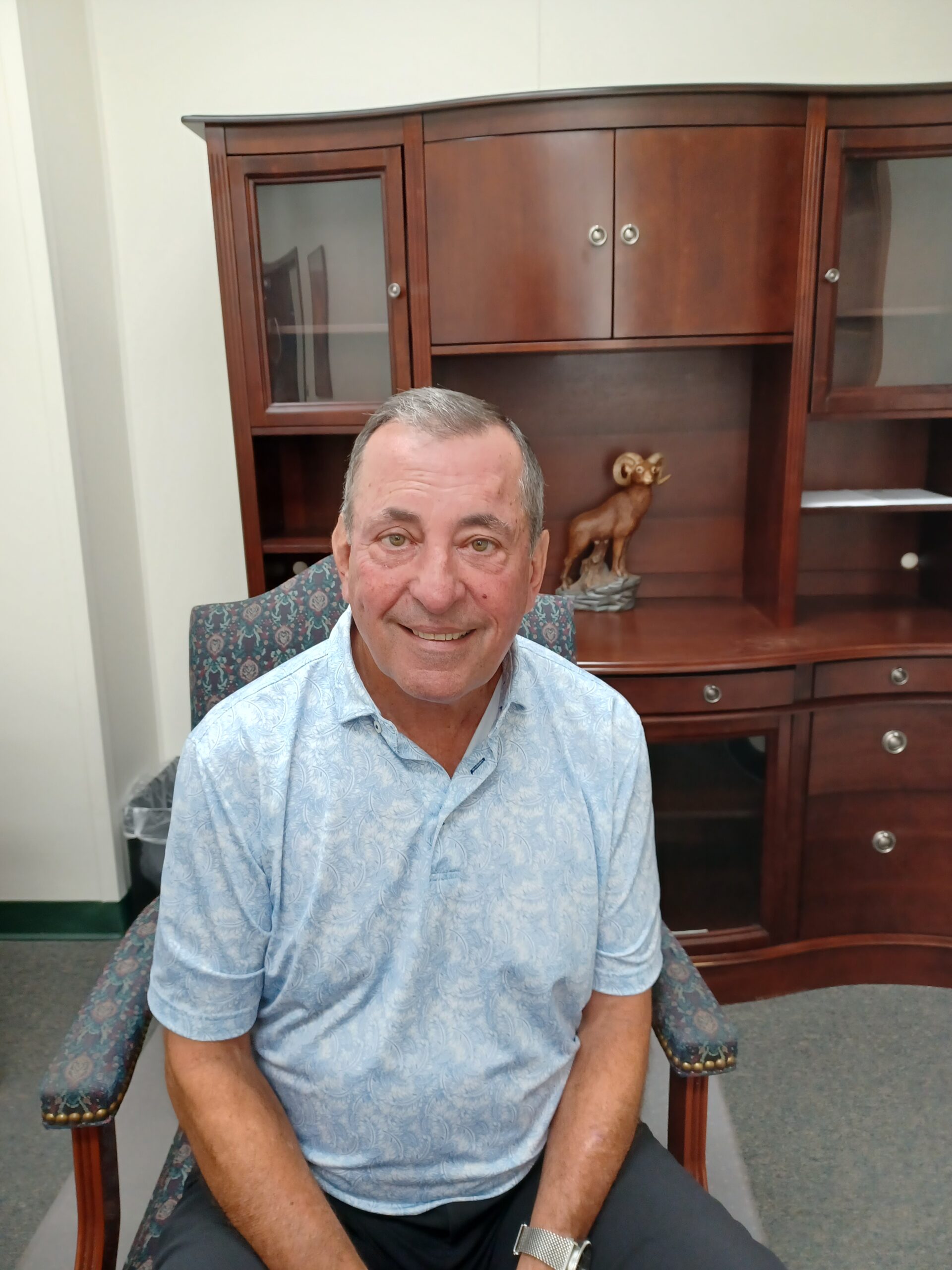
A Thirst for Innovation: The Future of Water Technologies in Ada, Oklahoma
October 2, 2022 by Jessika Leatherbury
By: Sunnie Dawn Baker
 Duane Smith is sitting on top of the world, or more specifically, on top of world-leading research about the Arbuckle Simpson Aquifer. Smith is the Executive Director of the Oka’ Institute at East Central University in Ada, Oklahoma. The Aquifer, according to Smith, “is a unique geological formation and not just in this region or in Oklahoma, but in the world. We have scientists from around the globe coming here to study.” For over 50 years, researchers in Ada have been studying ground water, shaping policy, and creating the exciting potential for new technology and innovation. Ada is home to the EPA’s Robert S. Kerr Environmental Research Center, the Chickasaw Nation, East Central University, an engaged municipal government and economic development office, and, since 2016, Ada is now home to the Oka’ Institute. With the creation of the Oka’ Institute and the vision of local leaders such as Duane Smith, Ada is positioned to continue as a global hub for innovative water research, technology, and sustainability efforts that will change the world.
Duane Smith is sitting on top of the world, or more specifically, on top of world-leading research about the Arbuckle Simpson Aquifer. Smith is the Executive Director of the Oka’ Institute at East Central University in Ada, Oklahoma. The Aquifer, according to Smith, “is a unique geological formation and not just in this region or in Oklahoma, but in the world. We have scientists from around the globe coming here to study.” For over 50 years, researchers in Ada have been studying ground water, shaping policy, and creating the exciting potential for new technology and innovation. Ada is home to the EPA’s Robert S. Kerr Environmental Research Center, the Chickasaw Nation, East Central University, an engaged municipal government and economic development office, and, since 2016, Ada is now home to the Oka’ Institute. With the creation of the Oka’ Institute and the vision of local leaders such as Duane Smith, Ada is positioned to continue as a global hub for innovative water research, technology, and sustainability efforts that will change the world.
Duane Smith is a self-professed “water boy.” He is passionate about water and has made water and water sustainability issues his life. While Smith originally came from a small town in South Central Kansas but has been in Oklahoma since he went to OU and now considers himself an ‘Okie.’ Smith was the executive director of the Oklahoma Water Resources Board for 32 years and in 2010, he went to Afghanistan with the Corps of Engineers working on water power and transportation infrastructure. After retiring from his position at the Water Resources Board, Smith worked as a consultant. Starting this year, he had a chance to advocate for one of our most precious resources in a new capacity, as Executive Director of the Oka’ Institute.
Since Smith’s tenure began, the institute has developed a strategic plan and a planning initiative to look at all the different efforts of Oka’. They have applied for over 60 million dollars’ worth of grants, many in coordination with the Chickasaw Nation. They also hired Amy Hays as Assistant Director of Development and Outreach to look for funding opportunities, as well as to focus on continuing to build and strengthen the relationships with the city, tribal governments, and universities.
One of the main things that Oka’ is doing in relation to research is helping to build capacity at ECU. Through applying for grants and bringing in more students, professors, and researchers, they are helping to grow the ecosystem surrounding water research, technology, management, and policy. In addition to water research, they are also working on a land stewardship program that helps landowners understand the best practices to use on their land. While part of this is ecological science, they are also utilizing social sciences to examine the behaviors of owners to see why they do what they do, or, why they don’t do what they should do. Oka’ is a unique space compared to other university water center and institutes. While they are facilitating research, they are really talking about water sustainability, management, and policy. The research works in coordination with these goals and can be used to help shape policy. Smith says, “Water sustainability is a necessary thing that is going to help us survive in the future. It is absolutely critical for our survival.”
Smith describes how water is critical for survival. There have been recent headlines about historic and devastating drought conditions that the Western United States or issues that come from disinvestment in critical infrastructure in economically distressed areas. In Ada, though, we are fortunate to not have to worry about these things because of our fresh spring water bubbling up from underground. However, it is necessary to have the appropriate technologies and policies in place so that this is something we never have to worry about. As Smith says, “We can avoid some of those struggles if we are smart and can learn how it’s been done in other places.” In our area, it isn’t just about questions of do we have enough water to drink or shower or water our crops. It also goes to the quality of life and allowing us to have the natural resources that we can enjoy.
While survival and sustainability are necessary for our community, Ada has the potential to go further and bigger, creating technologies that can be used on a global scale. There are three main parts to this water innovation initiative: scientific research, development of water policies, and startup commercialization. This is where the partnership aspect of future water tech can be highlighted the most. The first step, scientific research, can be facilitated by the Oka’ Institute. Tech startups could make a difference in our community, but also in the world.
Since 1966, Ada has been home to the EPA’s Robert S. Kerr Environmental Research Center, and the facility creates research focused primarily on ground water in many aquifers and areas below the surface throughout the U.S. Many of these researchers have been recognized throughout the world for their contributions to various scientific fields. A number of EPA researchers have made Ada a long-term home and have served on community boards, on city council, or have found positions as professors at East Central University. This has created an active community of water expertise and research throughout the Ada-area and this has led to a high degree of technical knowledge and sophistication in the City of Ada’s long-range resource planning and engineering.
Research alone is not enough, though. It is also necessary to have the right kinds of water policies at the governmental level. This is where the City of Ada and the Chickasaw Nation can work together with Oka’ to shape the policies surrounding water. East Central University also plays a role in this with their Master’s Program in Water Resources Policy and Management. The graduates of this program can help mold future policies that will be beneficial to the environment, water sustainability, as well as the development of future technologies. The Chickasaw Nation also maintains and office of natural resources with staff that have expertise in community water planning and sustainability.
The final step, where startups can take research and technology and turn it into private companies, a step termed “commercialization,” is the current focus of the Ada Jobs Foundation. This step is crucial in the development of scalable water tech startups. If someone has an idea for a water tech startup, it is necessary to make sure that it is an original idea and no that it doesn’t infringe on other patents but, perhaps even more importantly, they need to make sure that there is a market for the project. It doesn’t matter how great an idea is if nobody needs it and nobody is willing to buy it. Many scientists and researchers benefit from startup support services, such as accelerator and commercialization programs, as they can provide the business support and expertise that can pair with the scientific research process. In essence, these programs help connect problem solutions with a business model and practices that can be taken to a customer or a market.
This is where entrepreneurship can play a role in the future of our water practices. As Smith says, “We have a number of students here that are entrepreneurs and building on some of the traditional programs and looking more specifically at water and water technologies.” When entrepreneurship and water technology is tied together, especially with the support of the existing institutions, great things can happen. Oka’ is supporting water tech entrepreneurs by partnering with organizations like the Ada Jobs Foundation to look at emerging tech in the water sector. Smith says, “One thing we need desperately are new technologies around water and wastewater infrastructure.” Also, Oka’s work with land stewardship creates better nutrition and soil health which can go hand in hand with businesses that can eventually help sell these technologies.
With all of these entities working together toward a larger goal, Ada has the potential to be a leader in distributed water technologies. Centralized water systems, like those in larger towns and cities, usually have a middleman they will go through if they are having a water issue. The city would contact their water consulting firm and they would find a solution. However, in smaller, rural, areas, these towns do not necessarily have the money to spend on the high dollar consulting firms, so they need to be able to find their own solutions. These are the decentralized water systems. So, in this case, if a town had an issue, they could go directly to the new business and order their solution to be delivered so their problem could be solved. And it is these cases where the water tech startups in Ada could be most beneficial and have the room to grow.
This is a model that is not unique to Ada and has been successful around the world. There are many places, known as “water clusters,” where many different entities partner with each other in order to produce significant water technologies. According to Jim Eldridge, CEO of the Ada Jobs Foundation, “we look to other water innovation clusters, such as the Water Council in Wisconsin or Water Start in Las Vegas. These innovation efforts have brought together scientific research, progressive public policy, and innovation tools, such as accelerators and incubators, to help commercialize exciting new technologies.”
These efforts are further bolstered by the support of our legislators, specifically Representative Tom Cole, who submitted a community project funding request for fiscal year 2023 to the House Appropriations Committee. If approved by Congress, this could give $2 million to the City of Ada for a Water Cluster Development and Innovation Center. Something like this could provide the space and resources necessary for Ada to truly become a global force in water management, sustainability, and ecology. The technologies created and commercialized through these efforts could have a profound effect on our community, but also communities all around the world, all while bringing more jobs and wealth to the Ada area.
For Smith, this is of upmost importance, and he is trying to direct the conversation toward going beyond consumptive uses relating to industry or cities. He says:
It’s about the entire spectrum of uses. This means quality of life. That’s why it’s so important. Do you want to go to the Blue River and fish? Do you want to go to Lake Texoma and water ski? Do you want water in our creeks on a reliable basis? Those types of things are what makes Ada and this region special.
In order to thrive in the 21st century and beyond, it is necessary to think proactively and creatively about the different ways we approach the management and policies of this resource. Thankfully, the Oka’ Institute is positioned to help facilitate this type of thinking. Whether it is bringing together all the disparate elements in our community, taking an active position of advocacy, or encouraging new ways of thinking, Duane Smith is ready to take on these challenges. As he says, “The future looks very bright.” And when everyone works together, it can be very bright indeed.
Sign up to receive more news from the Ada Jobs Foundation HERE!
Written by
Jessika Leatherbury
You may also interested in:
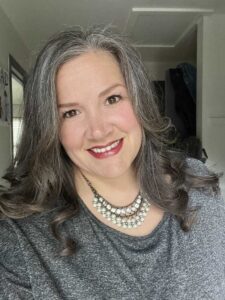
Adapt and Overcome: Allison Poe’s Recipe for Resilience and Growth
By: Sunnie Dawn Baker Allison Poe has always followed her feet. She waits for the signs to appear and, once she recognizes them, she travels that path, and has never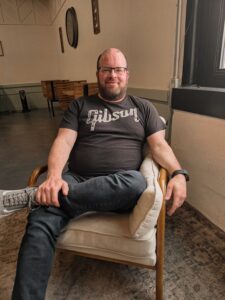
Jeff Warren: A Life in Sound, Vision, and Storytelling
By: Sunnie Dawn Baker When Jeff Warren got involved in the Houston music scene as a teenager, he had no clue where his path would lead. Now, nearly thirty years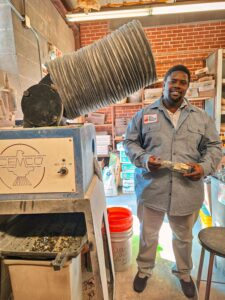
From Pitch to Progress: ECU's Glass Recycling Program Turns Waste into Opportunity
By: Sunnie Dawn Baker In 2018, Dr. Christine Pappas competed in Ada Jobs Foundation’s Big Pitch Competition by promoting grinding glass bottles into sand. She won the Big Pitch that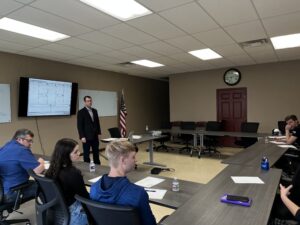
The Importance of Customer Discovery: Know Your Audience and Know Your Market
By: Sunnie Dawn Baker Entrepreneurs and small business owners must consider many factors to achieve success, with their target market being one of the most crucial. Sometimes, when people are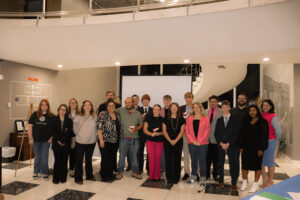
What Does Economic Development Do for You? The Significance of the Economic Multiplier
By: Sunnie Dawn Baker People often find the term “economic development” vague and confusing. Understanding how economic development works and benefits the community can be challenging. Though there are many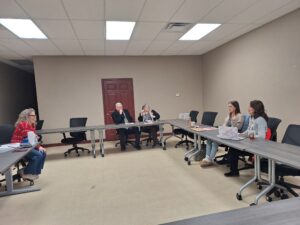
Helping Entrepreneurs One Workshop at a Time: Lauri Rowe and QuickBooks for Small Businesses
Entrepreneurs tend to be filled with passion and big ideas. They have found a solution to a problem they see in the world, and they barrel ahead, excited for their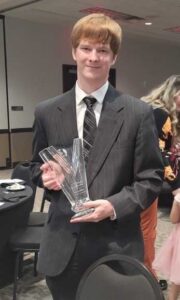
Hunter Cook: Technology, Entrepreneurship, and the Written Word
By: Sunnie Dawn Baker Hunter Cook started writing when he was seven years old. At first, he wanted to write comic books, but then he realized he couldn’t draw. He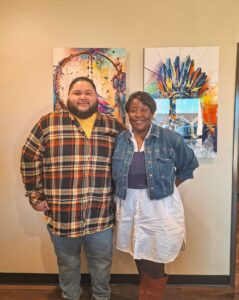
Empowering Native Artists: FAME App Brings Innovation to First American E-Commerce
By: Sunnie Dawn Baker Entrepreneurs are problem solvers. They are constantly striving for solutions to issues they see in the world or in their own lives. In the case of
Learn, Connect, and Grow: 2025 Workshops for Aspiring and Current Business Owners
By: Sunnie Dawn Baker A new year brings new possibilities, and, at the Ada Jobs Foundation, it also brings a new round of programming and workshops. As the local Economic